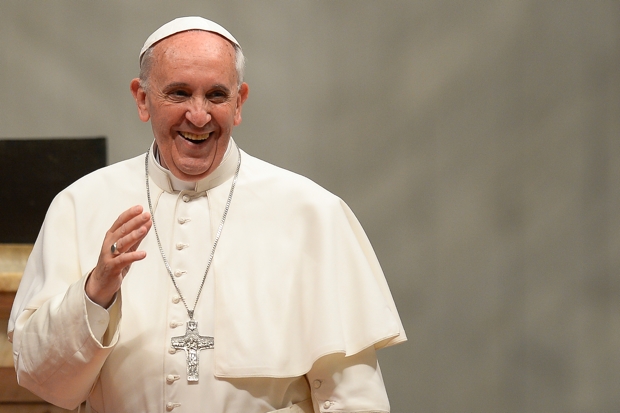Pope Francis has just given implicit permission for many divorced-and-remarried Catholics to receive Holy Communion. But he’s done so surreptitiously. Effectively, Francis has pulled a fast one on conservative cardinals who didn’t want the rules changed. Very fast, in this case.
On 5 September, he received a copy of draft guidelines, written by the bishops of Buenos Aires, on giving communion to people in ‘irregular’ marriages. They were extremely liberal – off the charts in Catholic terms. The Pope gave them a ringing endorsement on the same day.
That’s a big deal. But the whole business of communion for the divorced-and-remarried has become so complicated that this latest twist has gone largely unreported. The best attempt to unravel it all can be found here, in Crux magazine.
Here are the guidelines and the Pope’s letter. Ross Douthat of the New York Times has spotted the story; he reckons that Francis, having tried ‘by hook or by crook’ to get the world’s bishops to back his liberal stance, and failed, is now using devious methods to circumvent traditional teaching, effectively leaving Catholicism ‘with two teachings on marriage and the sacraments’.
The Argentine bishops’ guidelines were an interpretation of Amoris Laetitia, the Pope’s 200-page ‘exhortation’ on the subject of marriage published in March. Amoris Laetitia appeared to uphold the Church’s traditional rule that Catholics in second marriages can’t receive communion unless the first marriage has been annulled or they agree to live with their spouse ‘like brother and sister’ (i.e., not having sex). I say ‘appeared’, because the exhortation – couched in loose and clunky prose, like everything Francis writes – was evasive on this particular question.
Douthat is surely right that the Pope planned to relax the rules dramatically, but last year’s synod of bishops sent him a clear message that it wanted the communion ban upheld. Having called the synod, Francis had backed himself into a corner. There were, however, a few ambiguities in Amoris Laetitia – deliberate ones, we can now see – that allowed liberals to argue that, if you read between the lines, the Pope had changed the rules.
That’s what the Argentine bishops have just claimed, spinning the document so far in a liberal direction that it’s almost unrecognisable. But not unrecognisable to its author, Francis. He barely had time to read the guidelines – sent to to him in a semi-finished state – before he said:
‘The document is very good and completely explains the meaning of chapter VIII of Amoris Laetitia. There are no other interpretations.’
There are no other interpretations. Uh? As Dan Hitchens points out, ‘the bishops of Poland and Costa Rica have said they’ll stick to the established practice; so has Bishop Philip Egan of Portsmouth, Archbishop Charles Chaput of Philadelphia, and – in a document released last week – the six bishops of Alberta, Canada.’ They won’t be changing their minds.
According to the bishops of Buenos Aires, couples living in sexually active second marriages don’t need ‘permission’ to receive the sacrament. They should, however, exercise ‘discernment’ guided by a priest. You’ll need to read the whole text to grasp their convoluted argument.
The episode raises some puzzling questions. Here are a few of them. It’s too early to be confident of the answers.
• Why did Francis approve a highly contentious draft document in such a rush? Some of the Pope’s critics describe the Bergoglian modus operandi as ‘Jesuitical’, meaning manipulative. But the Society of Jesus is intellectually subtle; this looks more like moving goalposts in the middle of the night and being caught in the spotlights. It’s bizarre. You can’t help wondering if someone close to the Pope had a hand in drawing up the guidelines for Francis’s former diocese, which might mean that he was familiar with them long before September 5.
• Are the Buenos Aires guidelines on communion for the divorced-and-remarried intended for the whole Catholic Church? After all, they’ve received the papal imprimatur. Unlikely, at least in the short term. The Polish and African bishops aren’t about to let a pope with such a rudimentary grasp of theology overrule the verdict of Jesus in Mark’s Gospel: ‘Whoever divorces his wife and marries another woman commits adultery against her’. Francis must realise this. Is he therefore happy to tolerate ‘local’ solutions to pastoral problems – in other words, a Catholic Church in which doctrine is geographically adjusted, as it is in different provinces of the Anglican Communion and rival Orthodox patriarchates? Moving to that structure won’t be a smooth experience and the church won’t be very catholic if it happens. Is Francis so convinced of his own position (whatever that is) that he’s ready to countenance schism?
• Could this startling pronouncement herald a shake-up of the Vatican’s doctrinal watchdog, the Congregation for the Doctrine of the Faith? Francis doesn’t hide his low opinion of its prefect, Cardinal Gerhard Müller, a conservative appointed by Benedict XVI. If Müller were sacked and replaced by, say, Cardinal Christoph Schönborn – an Austrian nobleman and former Ratzinger protégé who has turned into a liberal waffle-merchant in his old age – then the Buenos Aires guidelines could be infiltrated into middle-of-the-road dioceses. (Westminster, for example, where the local bishop, Cardinal Vincent Nichols, has been described as ‘probably the leading papolator in the college of cardinals’.) This would still raise the spectre of schism.
• Alternatively, might the Pope simply lose interest in the divorced-and-remarried question? Don’t rule it out. Fr Raymond de Souza argues in the Catholic Herald, that Francis has a habit of making impulsive, sweeping decisions and then reversing them. He asks: ‘Does the improvisational, non-consultative mode of the Holy Father’s reforms mean that he can move fast, going back to fix up the details later? Or does it mean that he simply goes back, undoing what he had proposed to do for lack of proper preparation and attention to detail?’ To put it differently, is Bergoglio a Machiavelli or a Baldrick?







Comments